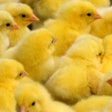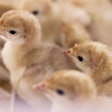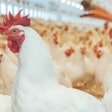The first delivery of Cobb500 parent chicks from the new Cobb-Vantress production complex at Suizhou, in Hubei province west of Shanghai, is scheduled to be made in the spring following the initial placement of grandparent stock in December.
“We’ve been waiting for this moment since we started this Cobb China project more than two years ago,” said Denny Chan, director of China operations.
“Before placing the chicks, the North Star Farm was tested free from disease, and we’ve held training sessions for our farm workers who will take care of the chicks covering biosecurity, stock management and work safety. We care equally about the health and welfare of our chickens as well as our people.”
Pelayo Casanovas, Cobb general manager for the Asia-Pacific region, said the project would supply five million parent stock a year from the Hubei complex to the Chinese market: “Besides the prime quality of our products, we will focus on providing our Chinese customers with a high level of technical support so they can achieve the full potential of the Cobb breed. Our goal is to become the breed of choice across Asia including China by 2017.”
David Juenger, Cobb director of global support services, said that in planning and building the China project a lot of emphasis had been placed on biosecurity.
“We have well-designed facilities so we can achieve the Cobb worldwide standard in China,” he said. “We’re confident that we will be able to keep the grandparents free of major diseases such as mycoplasma and salmonella all the way through the production cycle. I believe our China customers will see a difference in our products.
“As part of the biosecurity protocol, before returning to work from vacation the workers are required to be quarantined at the living area of the farm for 72 hours. This down time is a further step we’re taking to reduce the risk of people carrying disease to the birds.”

















